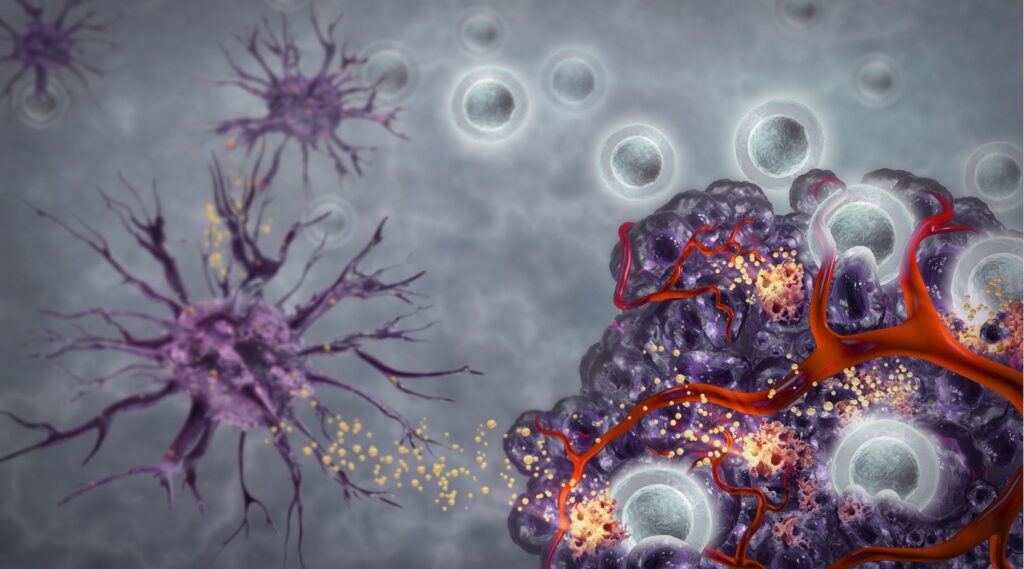
Immunotherapy has emerged as a groundbreaking approach to cancer treatment, harnessing the power of the immune system to fight cancer cells. This innovative treatment modality has shown remarkable efficacy in various types of cancer and has transformed the landscape of cancer care. In this article, we explore the concept of immunotherapy and highlight the significant advancements achieved through clinical trials. By understanding the potential of immunotherapy and the critical role of clinical trials, we can grasp the evolving landscape of cancer treatment.
Understanding Immunotherapy:
Immunotherapy is a type of cancer treatment that enhances the body’s immune system to recognize and destroy cancer cells. It stimulates the immune response, enabling immune cells to target and attack cancer cells more effectively. Unlike traditional treatments such as chemotherapy or radiation therapy, immunotherapy focuses on strengthening the body’s natural defenses.
Mechanisms of Immunotherapy:
Immunotherapy employs various mechanisms to combat cancer. These include immune checkpoint inhibitors, which block the proteins that inhibit immune responses, allowing immune cells to recognize and attack cancer cells. Other approaches include adoptive cell therapy, cancer vaccines, and cytokines that enhance immune responses.
Benefits of Immunotherapy:
Immunotherapy offers several benefits in cancer treatment. It has demonstrated significant and durable responses in a subset of patients, even those with advanced or metastatic cancers. Immunotherapy can provide long-term remission, improve overall survival rates, and potentially offer a more targeted and less toxic treatment option compared to traditional therapies.
Role of Clinical Trials:
Clinical trials play a pivotal role in advancing immunotherapy as a standard treatment option. These trials evaluate the safety and effectiveness of new immunotherapeutic agents, explore novel combinations of therapies, and identify patient populations most likely to benefit. Participation in clinical trials provides patients with access to cutting-edge treatments and contributes to the development of improved cancer care.
Phases of Immunotherapy Clinical Trials:
Immunotherapy clinical trials typically progress through several phases. Phase I trials focus on assessing the safety and dosing of a new treatment in a small group of patients. Phase II trials expand the study to a larger group to evaluate the effectiveness and monitor side effects. Phase III trials compare the new immunotherapy with standard treatments to determine its superiority. Phase IV trials occur after regulatory approval and gather additional data on long-term effects and outcomes.
Combination Therapies:
Combining immunotherapies with other treatment modalities, such as chemotherapy, targeted therapies, or radiation therapy, is an area of active exploration in clinical trials. Combination therapies have shown potential synergistic effects, enhancing the immune response and improving treatment outcomes.
Identifying Biomarkers:
Biomarkers play a crucial role in guiding patient selection for immunotherapy and predicting treatment response. Clinical trials aim to identify specific biomarkers that can accurately predict which patients are most likely to benefit from immunotherapy. This personalized approach ensures that the right patients receive the most appropriate treatment.
Overcoming Challenges:
Immunotherapy has shown remarkable success in certain cancers; however, challenges remain. Response rates can vary among different cancer types and individual patients. Additionally, resistance to immunotherapy can develop over time, necessitating further research to understand and overcome resistance mechanisms.
Future of Immunotherapy:
Immunotherapy continues to evolve, and ongoing clinical trials hold great promise for the future. With advancements in understanding the immune system, identifying new targets, and developing innovative immunotherapeutic approaches, the future of cancer treatment looks increasingly immunotherapy-driven. Personalized immunotherapy strategies tailored to individual patient profiles may become the cornerstone of cancer care.
Summary:
Immunotherapy has revolutionized the field of cancer treatment, offering new hope and improved outcomes for patients. Through rigorous clinical trials, researchers are expanding our understanding of immunotherapy, identifying optimal treatment combinations, and refining patient selection criteria. For patients seeking specialized and comprehensive cancer care, Cancer Care Pune stands as a leading cancer clinic dedicated to providing innovative and personalized treatment options, including immunotherapy.
As the field of immunotherapy progresses, continued collaboration between researchers, healthcare professionals, and patients is vital. Participation in clinical trials and partnerships with renowned institutions like Cancer Care Pune pave the way for advancements in immunotherapy, bringing new hope and improved treatment options to individuals affected by cancer. By choosing Cancer Care Pune, patients can access the expertise and advanced treatments needed to optimize their outcomes and improve their quality of life.




